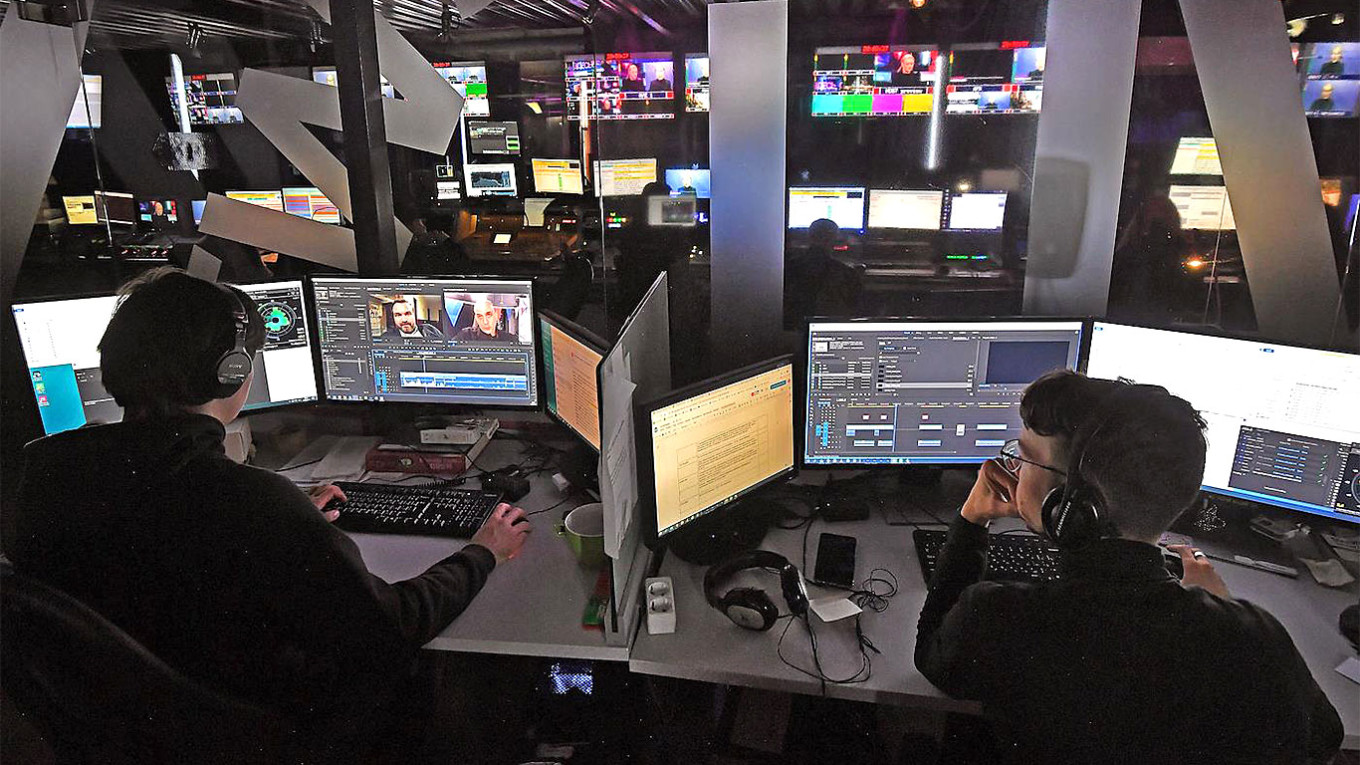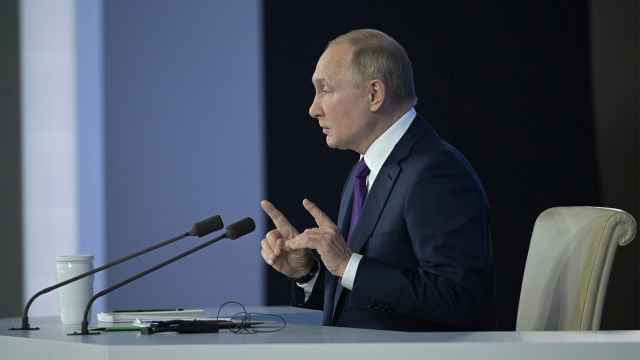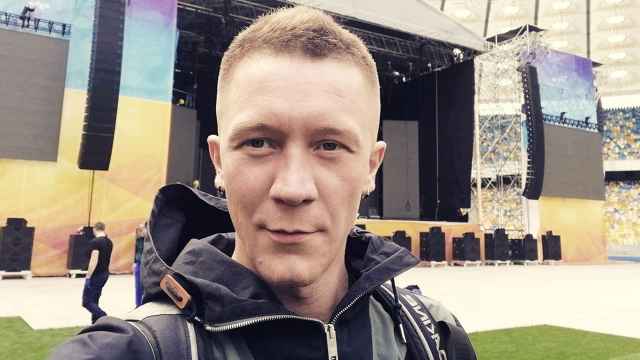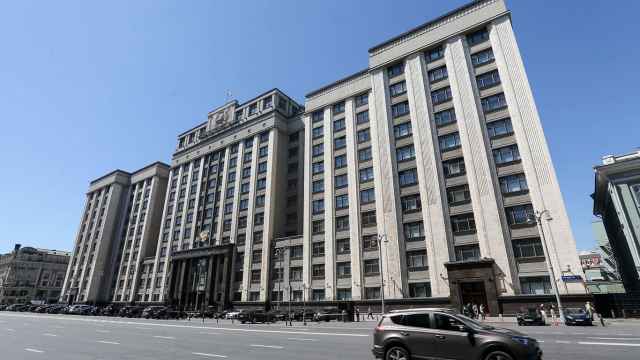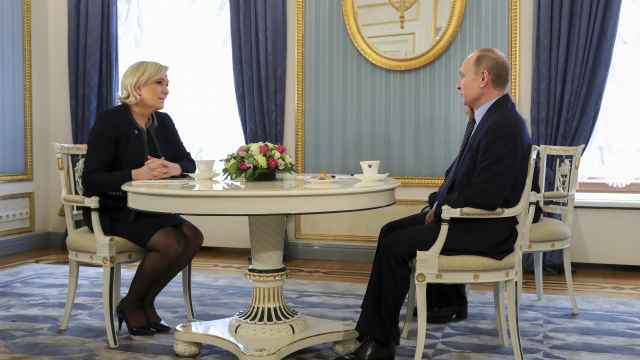Latvia’s decision Tuesday to withdraw the broadcast license of independent Russian television channel Dozhd caused disbelief and anger among the media outlet’s journalists and soul-searching among other Russian journalists in exile.
The Baltic country’s media watchdog said in a statement announcing the revocation that Dozhd posed “threats to national security and social order” following a series of fines issued over the outlet’s coverage of the war in Ukraine.
“I’ve been fighting for all these years to remain human in any situation… [but] I feel like a disgusting scoundrel,” Dozhd co-founder Natalia Sindeeva said between sobs in a video posted to her Telegram channel after the announcement.
“The entire TV channel is at stake.”
While Dozhd has yet to announce its response, the Latvian decision poses difficult questions for other independent Russian media outlets forced into exile in the wake of Moscow’s invasion of Ukraine.
Dozhd was one of a group of independent Russian media outlets that re-established themselves abroad after the passage of repressive wartime censorship laws earlier this year, with many congregating in the Latvian capital.
Other independent Russian media outlets based in Riga include Meduza, the BBC Russian Service, and Novaya Gazeta Europe.
“It’s a very bad sign for journalists,” said one reporter from a Russian-language media outlet that moved to Riga after the start of the war who requested anonymity as he had been told not to comment on the Dozhd situation.
“Journalists obviously cannot go back to Russia where they are threatened with criminal prosecution. But they are also unlikely to be able to work quietly in Latvia.”
Many would “think of moving to another country as soon as they have the opportunity,” said another Russian journalist in Latvia who also requested anonymity.
Dozhd first came under fire when anchor Alexei Korostelev last week asked TV viewers to send information on Russia’s drafted soldiers and mistakes during the mobilization. The channel was subsequently fined for displaying a map showing annexed Crimea as part of Russia and for calling the Russian Armed Forces “our army.”
Some Ukrainian and Latvian commentators interpreted Korostelev’s words as an expression of support for Russian troops in Ukraine.
The Latvian authorities opened an investigation into Dozhd on Friday, saying that “the statements made in the program are directed against the interests of Latvia's national security.” The Latvian National Electronic Mass Media Council (NEPLP) on Tuesday also called for a ban of Dozhd’s YouTube channel in Latvia.
Latvia’s State Security Service urged the authorities on Tuesday to bar Korostelev from entering the country, adding that it also warned Dozhd editor-in-chief Tikhon Dzyadko of possible “criminal liability in case of committing criminal offenses.”
“Today's decision is absurd and it has nothing to do with common sense,” said Dzyadko during Tuesday’s live news show.
“When you are switched off the air for far-fetched reasons for the first time — it is perceived as a tragedy,” Dzyadko said, referring to the channel’s removal from Russian cable packages in 2014.
“When eight years later you are called a threat to the national security of Latvia — it is perceived as a farce,” he said.
Dozhd — which started broadcasting from Latvia in June after its staff fled Russia — said it would continue to broadcast on its YouTube channel. The channel also has offices in Tbilisi and Amsterdam.
Korostelev, who was fired by Dozhd for his words, said on Friday that they had been no more than “a slip of the tongue.”
Despite his protestations, his words have caused widespread anger, however.
“When ‘good Russians’ are helping ‘bad Russians’ — can the world finally understand that they are all the same?” Ukrainian Culture Minister Oleksandr Tkachenko wrote on Telegram on Friday.
Over the weekend, at least three journalists resigned from Dozhd to show their solidarity with Korostelev, while others told The Moscow Times that the current situation reminded them of the crackdown on opposition media in Russia and would ultimately only help Moscow push its pro-war narrative.
“It was the worst thing we could do in that situation… I want to say sorry,” Sindeeva said in an emotional video statement on Tuesday after the revocation of the license, in which she also asked the fired journalists, including Korostelev, to return.
International media watchdog Reporters Without Borders (RSF) urged Latvia on Tuesday to rethink its decision.
“Dozhd is one of the few independent channels with Russian journalists broadcasting to the Russian-speaking public,” Jeanne Cavelier, the head of RSF’s Eastern Europe and Central Asia desk, said in a statement.
“The withdrawal of its license would be a serious blow to journalistic freedom, independence and pluralism.”
Some Ukrainian officials also expressed their support for Dozhd.
“They explained their position absolutely clearly, that their position is anti-war and pro-Ukrainian,” Ukrainian President Volodymyr Zelensky's adviser Mykhaylo Podolyak said on Tuesday.
Latvia’s decision to revoke Dozhd’s license would make it harder to report “truthful and objective information for Russian-speaking audiences,” a Russian journalist in Latvia, who requested anonymity, told The Moscow Times.
“That is exactly what the Kremlin is trying to achieve.”
A Message from The Moscow Times:
Dear readers,
We are facing unprecedented challenges. Russia's Prosecutor General's Office has designated The Moscow Times as an "undesirable" organization, criminalizing our work and putting our staff at risk of prosecution. This follows our earlier unjust labeling as a "foreign agent."
These actions are direct attempts to silence independent journalism in Russia. The authorities claim our work "discredits the decisions of the Russian leadership." We see things differently: we strive to provide accurate, unbiased reporting on Russia.
We, the journalists of The Moscow Times, refuse to be silenced. But to continue our work, we need your help.
Your support, no matter how small, makes a world of difference. If you can, please support us monthly starting from just $2. It's quick to set up, and every contribution makes a significant impact.
By supporting The Moscow Times, you're defending open, independent journalism in the face of repression. Thank you for standing with us.
Remind me later.




